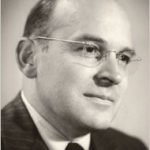Francis Otto Matthiessen, also known as FO Matthiessen, was born to a wealthy California family. He attended Yale and was selected for a Rhodes Scholarship in 1925. On his way back to Oxford to complete his second year, he met Russell Cheney, a painter and fellow Yale Skull and Bones Society member, twenty years Matthiessen’s senior. The two immediately fell in love, though remained closeted for most of their lives, particularly in professional circles. Nevertheless, they purchased a cottage in Kittery, Maine, where Cheney painted and they spent time together.
In the late 1920s, Matthiessen was given a teaching position at Harvard and shortly after began his most important work, American Renaissance: Art and Expression in the Age of Emerson and Whitman. This scholarship examined the work of Ralph Waldo Emerson, Nathaniel Hawthorne, Herman Melville, Henry David Thoreau, and Walt Whitman and the period between 1850 and 1850 in which all but Emerson wrote their most important works (The Scarlet Letter, Moby-Dick, Walden, and Leaves of Grass, respectively). Through the book has since been criticized for its exclusion of female and black authors writing during the same period, it was instrumental in creating the study of American literature. Matthiessen went on to write valuable books on TS Eliot, Herman Melville, and Henry James and the James family.
While writing American Renaissance, however, Matthiessen had an emotional breakdown and was institutionalized for nearly three weeks. He continued to struggle with depression for the rest of his life, which was compounded when Cheney died in 1945. Not long after, Matthiessen was accused of communism in the very beginnings of the Red Scare.
On April 1st, 1950, Matthiessen rented a room on the 12th floor of the Hotel Manger in Boston and jumped from the window. A note in the room said, “I am depressed over world conditions,” and requested his burial beside his mother. Also present were his keys to 87 Pinckney Street and a Skull and Bones Society pin.
